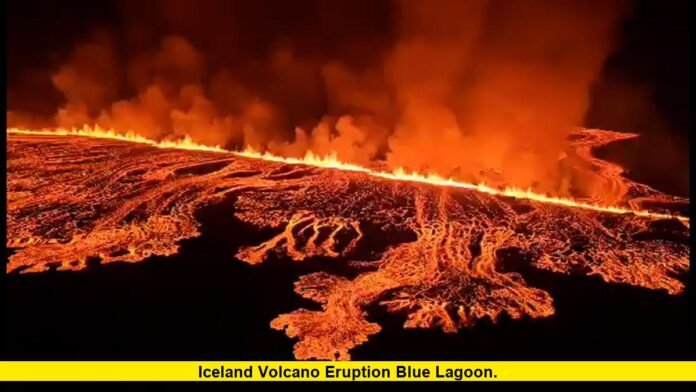In the early hours of July 16, 2025, the phrase “Iceland volcano eruption Blue Lagoon” surged to global attention as one of the country’s most iconic sites was evacuated after the Sundhnukur volcano erupted for the twelfth time in four years. This latest event not only illuminated the night sky with a fiery spectacle but also highlighted Iceland’s remarkable approach to volcanic hazards—balancing tourism safety with the awe-inspiring power of nature.
Eruption Sparks Evacuations on Reykjanes Peninsula
The eruption began around 4 a.m. local time near the Sundhnukur crater row, situated just northwest of the Blue Lagoon on the Reykjanes Peninsula. Intense seismic activity was recorded just hours before, prompting rapid action by authorities. Guests, staff, and tourists at the Blue Lagoon geothermal spa—a world-famous destination—were evacuated along with nearby residents from Grindavík and campsite visitors. Emergency protocols were enacted smoothly, ensuring everyone’s safety as lava burst from a fissure measuring nearly a kilometer in length.
Key Points Summary
- Eruption began July 16, 2025, at approximately 4 a.m.
- Location: Sundhnukur volcano, Reykjanes Peninsula, southwest Iceland
- Immediate evacuation of Blue Lagoon, Grindavík, and campsites
- No reported injuries, casualties, or infrastructure damage
- Eruption marks the 12th episode since 2021
- Air travel at Keflavík airport remains unaffected
Read also-Iceland Volcano Eruption: Latest Update on Reykjanes Peninsula Activity
Iceland Volcano Eruption Blue Lagoon: Impact and Safety
The section titled “Iceland volcano eruption Blue Lagoon” continues to draw focus as officials confirm that lava is moving southeast into uninhabited terrain. Thanks to the region’s careful planning, vital infrastructure—including the spa itself and other tourist facilities—remains undamaged. According to geoscientists, this eruption has been less intense than previous recent episodes. Its primary hazard has been elevated gas emissions, particularly sulfur dioxide, which have prompted public health advisories for nearby areas.
Precautionary measures at the Blue Lagoon, including protective barriers and remote gas monitoring, minimized risk to visitors. The Icelandic Meteorological Office and Civil Protection Agency maintained constant surveillance, updating the public via live feeds and official websites. The “witch’s hair” phenomenon—fine glass fibers created by rapidly cooling lava—was reported, posing some minor irritation risks for those in proximity.
Tourist Safety and Flight Operations
Despite the dramatic visuals and global headlines, the area’s quick, organized evacuation has left most of Iceland’s travel infrastructure untouched. Blue Lagoon management has emphasized guest safety, noting that all visitors were accounted for and relocated without incident. Importantly, flights in and out of the country’s primary airport, Keflavík, are operating normally. Authorities stress that the remainder of Iceland, including other key attractions, is open for business as usual.
The Spectacle and Science Behind the Eruption
Lava fountains up to 50 meters high cast a surreal glow over the peninsula, which has become a hotspot for volcanic activity since 2021 after 800 years of dormancy. Scientific monitoring indicates that these eruptions are being caused by tectonic shifts unique to the Reykjanes Peninsula. While the region has experienced more than a dozen eruptions in the past four years, each one further enhances understanding of Iceland’s dynamic geology.
| Stat | Value |
|---|---|
| Eruption Date | July 16, 2025 |
| Eruption Site | Sundhnukur, Reykjanes |
| Fissure Length | ~700–1,000 meters |
| Blue Lagoon Status | Fully evacuated |
| Air Travel Impact | None |
| Grindavík Evacuated | Yes |
What Happens Next for Blue Lagoon and the Peninsula?
The ongoing “Iceland volcano eruption Blue Lagoon” story continues to unfold with officials, scientists, and local communities maintaining vigilance. Residents and visitors have been urged to heed official guidance on air quality. Blue Lagoon expects to reopen once safety checks are complete and environmental conditions stabilize. Experts advise that volcanic activity is likely to remain a fixture in the area for years to come.
With Iceland’s natural wonders on full display, the stunning resilience of its people and the science-driven response reassure travelers dreaming of hot springs and dramatic landscapes that adventure awaits—just with a little extra caution.
If you have thoughts on the latest Iceland volcano eruption at Blue Lagoon or personal experiences in the Land of Fire and Ice, share your views below! Stay tuned for more live updates as this headline-grabbing event continues to develop.
